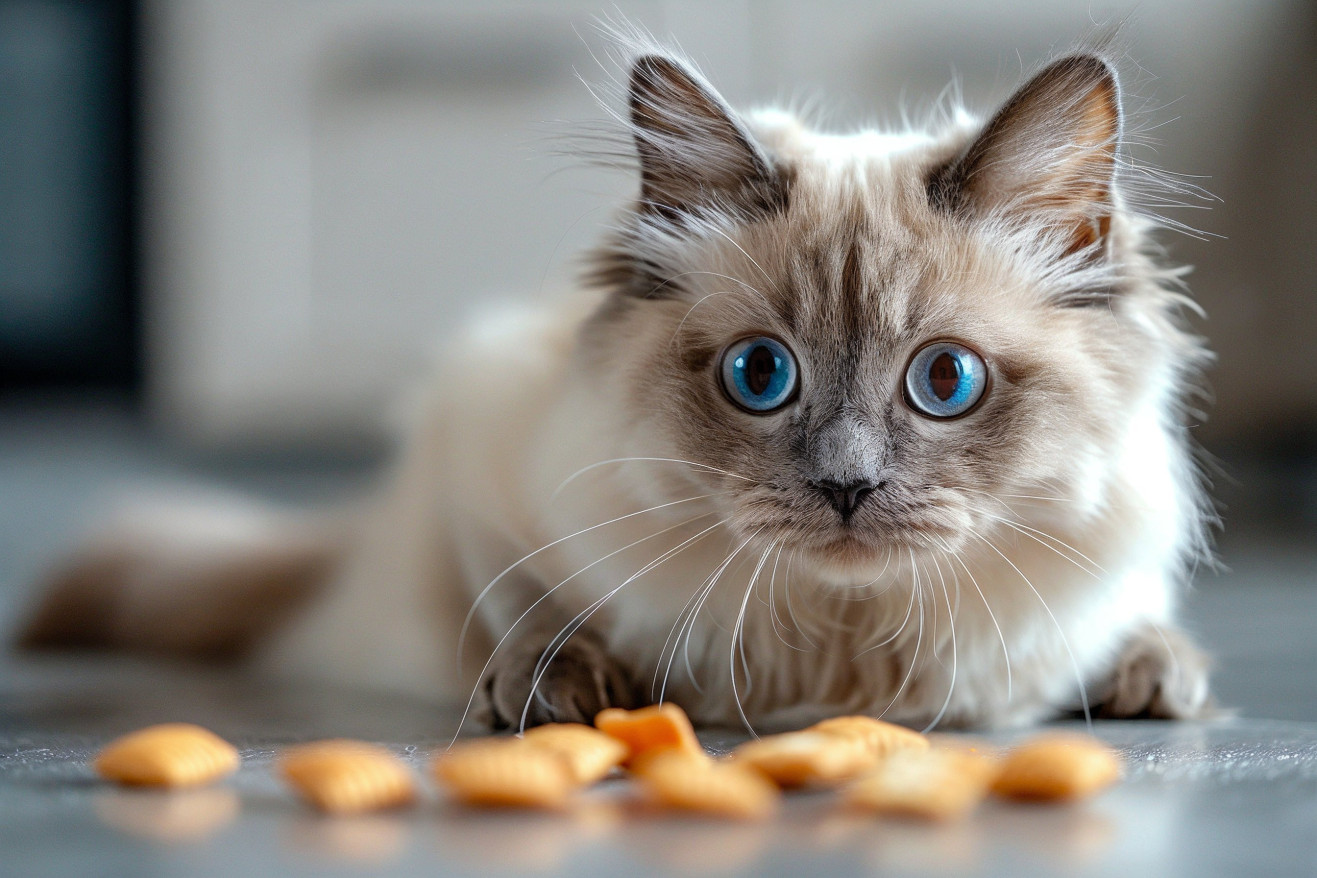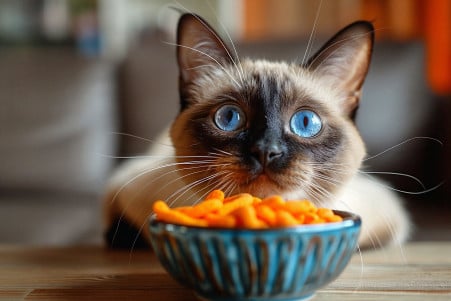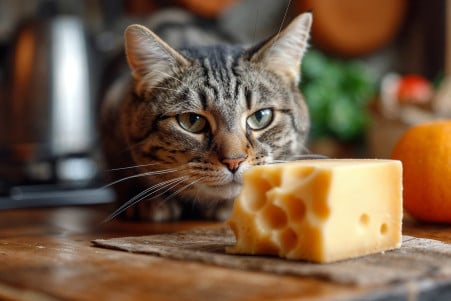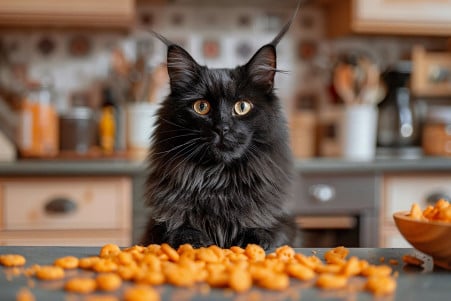Can Cats Have Cheez-Its? What to Know About Feline Dietary Risks
14 March 2024 • Updated 12 March 2024

While Cheez-Its may be a delicious snack for people, can you give them to your cat? While not poisonous, Cheez-Its are not a good idea to give to cats because they are high in sodium and fat and can lead to lactose intolerance.
While cats can eat Cheez-Its in small amounts on occasion without any immediate side effects, it’s best to stick to treats that are made specifically for cats to ensure that your pet has a healthy diet.
This article will look at veterinary information and nutritional research to explain the dietary risks of giving Cheez-Its to cats. It will focus on the differences between the human and feline digestive systems and nutritional needs, the risks of feeding cats human food, and the importance of making sure cats get a diet that meets their unique nutritional requirements.
By examining these topics, the goal is to offer evidence-based information that will help you make sure that you’re feeding your cat in a way that supports their health and happiness.
Can cats have Cheez-Its?
Nutritional Needs of Cats
According to the Cornell University College of Veterinary Medicine, as obligate carnivores, cats need a diet that is high in protein, moderate in fat, and low in carbohydrates. The Purina Institute adds that cats have specific nutritional requirements, including essential nutrients like taurine, arginine, preformed vitamin A, niacin, and arachidonic acid, that are important to their health and are naturally found in animal tissues.
It’s important to make sure that these dietary needs are met, and that’s why cat food is formulated to meet the standards of the Association of American Feed Control Officials (AAFCO). These standards ensure that cat food is complete and balanced for the various life stages of a cat’s life, including kitten, adult, and senior, and that it contains all the necessary nutrients in the right amounts.
It’s also important to make sure that cats don’t become overweight, which can lead to health problems like diabetes and lower urinary tract diseases. This is why it’s important to make sure that cats are fed a diet that meets their specific nutritional needs.
This includes not feeding them human food, which doesn’t meet the same nutritional standards and can lead to health problems. Instead, it’s important to make sure that cats are fed a diet that’s specifically formulated to meet their nutritional needs, which will help them stay healthy and active.
The Dangers of Feeding Cats Cheez-Its
Feeding cats Cheez-Its can be dangerous for a number of reasons, including nutritional imbalances and the potential for toxicity. Cats have very different dietary needs than humans, and processed, high-sodium, high-fat foods like Cheez-Its can throw off the balance of nutrients they require.
A study cited by PMC even says that imbalances like this can lead to obesity, diabetes, and urinary tract diseases, all of which are often made worse by diets that are high in the wrong nutrients.
Another issue is that Cheez-Its contain dairy, and most cats are lactose intolerant. Cats lose the ability to produce lactase, the enzyme that breaks down lactose, as they grow up. As a result, Dr. Sam Gilbert from Zoetis Petcare says that cats who are lactose intolerant can experience gastrointestinal upset and diarrhea when they consume dairy. This means that the lactose in Cheez-Its can cause digestive issues for many cats.
In addition, feeding cats foods that aren’t formulated to meet their nutritional needs can lead to long-term health problems. Cat foods that are formulated to meet the standards set by the AAFCO (Association of American Feed Control Officials) guarantee that all of a cat’s nutritional needs are being met.
Feeding cats human food, even as a treat, can throw this balance off and potentially lead to a shorter life. For the health of our cats, it’s clear that it’s best to stick to the diets that are recommended by veterinarians.
What Causes Lactose Intolerance in Cats?
Lactose intolerance in cats occurs when cats have low levels of the enzyme lactase, which is needed to break down the lactose in milk and dairy products. Although kittens are born with the ability to digest the lactose in their mother’s milk, they lose this ability after weaning, leading to lactose intolerance and the associated symptoms of stomach upset, diarrhea, and vomiting when they consume dairy.
The degree of lactose intolerance can vary, with some cats experiencing only mild symptoms and others experiencing more severe reactions.
Look for signs of stomach upset, pain, and changes in bowel habits. Dairy products can lead to stomach upset and may even contribute to obesity due to the high fat and sugar content of these products. This is why it’s important to avoid giving cats dairy-based treats like Cheez-Its.
For cats that enjoy the taste of dairy, “cat milk,” which is lactose-free, is a safer option. This milk is specially formulated to appeal to cats’ palates without the risks of lactose intolerance, so cats can enjoy it without any negative side effects. Choosing these lactose-free options will help keep your cat healthy and avoid the stomach upset that can come with inappropriate treats.
How to Keep Your Cat’s Diet Safe: Introducing New Treats
When it comes to introducing new treats to your cat’s diet, it’s important to do so with caution. Pawlicy Advisor suggests watching your cat for any negative side effects, like stomach upset or behavior changes, when introducing new foods.
It’s also important to make sure that the new treat is only a small part of their diet, with no more than 10% of their daily calories coming from the new food. If you notice any negative side effects, stop giving the treat and talk to your vet.
There are many healthy treats made specifically for cats that are formulated to meet their dietary needs. For example, freeze-dried meat treats are often more appealing to cats than traditional kibble. PetMD notes that these treats are safe and healthy for cats as long as they are given in moderation.
Make sure to talk to your vet before making any major changes to your cat’s diet to make sure the treat is safe for your cat’s specific health and life stage. In addition, VCA Animal Hospitals suggests feeding your cat at set times instead of free-feeding to help prevent food begging and overeating. This will help ensure that your cat has a healthy relationship with food and that their diet is well-rounded.
Final Thoughts on Cat Diets and Human Food
So, while Cheez-Its aren’t immediately toxic to cats, they do represent dietary dangers like high sodium and fat content, and potential lactose intolerance. They also don’t contain the essential nutrients that are important for a cat’s health, which shows the importance of a diet that’s tailored to their carnivorous nature and specific nutritional needs.
It’s important for pet parents to stick to cat-specific diets to ensure the health and longevity of their cats. It’s also important for pet parents to understand the potential effects of feeding cats human food, which can include obesity, nutritional deficiencies, and digestive issues. Good pet parents will talk to their vets and do their own research to make sure that any dietary choices or changes are benefiting their cats.
So, let’s prioritize our cats’ health over the temporary pleasure of sharing our food with them and make sure we’re doing everything we can to take care of them. After all, a cat’s diet is a huge part of their health, and as pet parents, it’s our job to handle it with care and responsibility.


